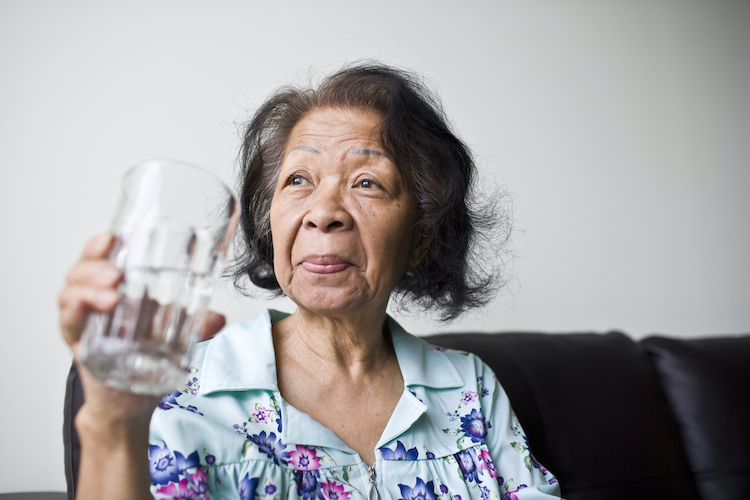
Learn the signs of dehydration in the elderly.
During the warmest time of the year, keeping up with proper hydration is necessary, especially for older adults. In fact, approximately 50% of all older adults are chronically under-hydrated, according to a recently available UCLA research study, which could lead to an assortment of health risks, including kidney stones, urinary tract infection, and also a higher risk for falls.
The frequency of dehydration in the elderly is linked to a number of factors, including:
- A decreased level of water naturally in older bodies
- Medication side effects
- Less awareness of the sensation of thirst
- A decreasing capacity to maintain an ideal fluid level balance within the body
- Decreased efficiency of the kidneys
- And much more
There is a basic calculation to figure out exactly how much water an older adult should drink each day. Take the person’s body weight in pounds, and drink 1/3 that many ounces of water daily. Somebody who weighs 120 pounds, for instance, ought to drink at least 40 ounces of water – about five 8-ounce glasses.
Time is of the essence in ensuring hydration in senior loved ones, as it is much easier to improve mild dehydration before it gets to be more serious. Symptoms include:
Minor Dehydration:
- Decreased, darker-colored urine
- Dry mouth
- Dizziness and fatigue
- Muscle cramping
- Irritability
- Headaches
Severe Dehydration:
- Disorientation and confusion
- Difficulty with walking
- Faint, fast pulse
- Low blood pressure
- Worsening of muscle cramps
- Sunken, dry eyes
- Skin that is wrinkled and has lost elasticity
- Bloating
- Quickened breathing
- Convulsions
Seek out medical attention promptly should you suspect dehydration in an older adult, to circumvent serious health complications that can develop rapidly.
If a senior loved one resists drinking enough water, try flavoring the water or offering juice, if it is an acceptable part of the older adult’s dietary plan. For individuals with conditions like diabetes or obesity, the sugar content in juice can be harmful. Sometimes, modifying the temperature of the beverage will make it more pleasing as well, such as heating up a cup of water with a little lemon to sip on each morning, and then offering cold water over crushed ice in the afternoon.
The key is always to have fluids available throughout the day. Geriatric nurse Anne Vanderbilt, CNS, explains, “What I often see in our advanced older adults – people in their 80s and 90s – is that they can’t sit down and drink a full 8-ounce glass of water. It fills them up, causes bloating and then makes them have to run to the bathroom. So little sips throughout the day are better.”
To help ensure the older adults you love are remaining hydrated and healthy, partner with At-Home Care Company for specialized Senior care in Des Moines, IA and the surrounding communities. Our caregivers are on hand to help supervise fluid intake, prepare nutritious meals, encourage older adults to remain physically active, and so much more for optimal wellbeing. Contact us at (515) 292-2650 for a free in-home evaluation and for more information about our exceptional senior care in Des Moines, IA!
